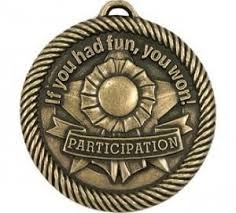You Get What You Work For, Or Do You?
January 13, 2020
Everybody wins, even if they didn’t deserve it. People all over the country allow children to be victorious based off of their age, but the problem is if they are taught victory after victory, the moment they lose for the first time they will not handle the defeat well.
As children, we did not love losing that soccer game or having to shake hands with the winning team in football, and even though good sportsmanship is being taught in schools and homes around the world, children are still given their victories by most people older than these children. This sense of unrealistic pride teaches these kids that they are unstoppable, and then they discover that they are like every other child out there. Most children under the age of 10 are given the accomplishment without having to achieve it, once they “come of age” they will begin to encounter defeat, and what was once a falsely accomplishing person becomes a bitter, frustrated, immature kid.
Once a child is handed a win, they are immediately happy. After several wins, the child obtains a sense of arrogance, this leads to unintended pride. Once this false sense of pride is broken, the child would not know how to hold the loss. Even if not extreme, any form of losing a competition or failing an exam will cause distress in the child. This can easily result in discomfort with parents, as they might not know how to control their child after such an episode.
While this is partly normal for little kids, these episodes can cause problems at home, even when a competition is not in place. two Israeli researchers, Avi Assor and Guy Roth, in the United States have conducted a series of experiments that consistently found that when children feel their parents’ affection for them comes from being well behaved, self-controlled or impressive in school or at sports, this promotes “the development of a fragile, contingent and unstable sense of self.”
Defeat is an undesirable moment. When you fail an exam or lose a game, you will most likely not feel highly of yourself. This easily applies to young children. Most children are taught to handle defeat, but there are those that are gifted victories. When a child does not learn how to lose, the chances that they will be successful in life is lowered due to bad sportsmanship. Interestingly, children can learn good sportsmanship after childhood, while it may be a more challenging than early on when habits are developing, it can still affect their lives for the better.
All in all, giving children a sense of false accomplishment based on their age is a common but unhelpful and possibly damaging idea. When children grow up, the false rewards received as a child will not serve them in the “real world” and they might not handle responsibilities well. When they do learn to accept the cold hard truth, they will be better off in life knowing that defeat is a healthy part of life and could lead to better relationships free of entitlement.

